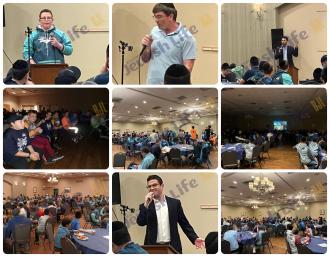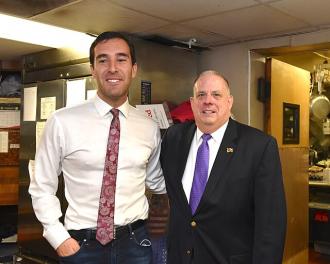You set your goal. You decided you needed to lose 12 kilo. And you set out to do it. You were given all the tools to get there; a good food plan, exercise and your determination to succeed. Week after week you got mostly good results. It was only when there was extremely cold winter weather that you couldn’t get outdoors for your daily power walk, but you did your alternative exercising on those days. In spite of a hectic schedule, you planned your eating and made sure to eat your meals and snacks as you should. And finally, success! You reached your goal, bought new clothes, felt great and were proud of yourself as you should be. This was Ken’s story.
Ken was a skype client from the United States. We first met in person when I made a trip to America last year. He was truly fed up with his being overweight and mostly inactive. He had read some of my articles in a local Jewish on-line publication and got interested. After my return to Israel he sent back his intake forms and we started. He met regularly with me and our dietician. He charted his food and exercise very carefully. He set a goal—he reached hit. But now what? Will Ken be typical and say “I did it” and go celebrate with donuts and ice cream and by going back to old and poor health habits? Or, will he stick with what he has learned, albeit with some modification, stay focused and hold on to his new, healthy lifestyle?
One of the many reasons people fail on diets is mindset. You have to take certain steps to lose weight and once you have lost that weight (you’ve gotten “there”) you can just let it all go and everything will stay the way it is. But that particular mindset is very far from reality. One of the things I am proud of in our clinic is that we are honest with our clients about the effort it takes for success and for maintenance of that success. Weight loss that is real and healthy takes work. To a degree, it is work all the time, because you have to be mindful all the time about what you are eating, how much you’re eating, and you have to adhere to your food program. But both on the exercise and diet front, once you have reach a goal, usually you can make some modifications to ease up somewhat on both time and intensity it takes on a daily basis. HOWEVER, YOU CAN NEVER QUIT!
Usually, by the time you reach your weight loss goal, presuming you are doing this the proper way, you have figured out your food and exercise. Hopefully, during this journey you have not felt deprived or hungry. You can now exercise with enough intensity that your muscle building exercise can be a little less often, but with more repetitions and sets. You can do aerobics 5 days a week and if intense enough, 25-30 minutes will be enough. Be active otherwise though. Always walk from place to place, use staircases, and park your car slightly far from you destination. This is forever.
But what about your eating? One of the reasons you have dropped weight is that you created a calorie deficit on a daily and certainly weekly basis. A calorie deficit means that you were using more calories per day than you took in. Your metabolism and the calories you burn through activity and exercise end up being more than the energy to take in from eating food. Now, you no longer need a deficit. Instead you need to maintain what that calorie deficit brought you and maintain it. This means eating the right amount of calories to keep you satisfied without letting the scale go up and at the same time exercising and being active. Keep in mind that your exercise is for your health in general and not just for losing weight.
Ken was interviewed by that publication and here is what he said:
BJL: Kalman, you have lost a lot of weight lately through a program you found through our publication. How do you feel the Alan Freishtat’s 10 Weeks to Health program has been different from previous weight loss attempts?
Ken: Alan's program is not a diet. It is a change in lifestyle. About seven years ago, I lost 20 pounds in about 10 weeks through severe calorie reduction and extreme exercise six days a week. Needless to say, I gained it all back. Alan's program has taught me how to eat smart and exercise appropriately.
BJL: What has been the most/biggest challenge for you on your path to a healthier lifestyle and how did this program help you with that?
Ken: My biggest challenge has been to get a grip on unhealthy snacking. Reduced-fat potato chips were part of my daily routine. Alan's program has made me account for everything I am eating and gives me plenty of healthy snack alternatives which are filling and nutritious.
BJL: Other than losing more than 20 pounds so far, what has been your biggest success?
Ken: Being able to move around! My body is so flexible now. I am no longer afraid of stairs (during my break at the office, I try to walk up 10 flights of stairs). In the past, my heavy video equipment, along with being overweight, had put a lot of stress on my knees and feet. Just last night, I picked up my video camera and shoulder rig and said, “Is that it? Did I forget something?” It felt so much lighter and I can move with it without any stress to my knees.
BJL: How has your mindset changed?
Ken: I really wasn't so conscientious about my weight in the past (maybe I should have been!). However, now, I must admit that I do feel more confident about myself.
BJL: Were you nervous to try a program that operated remotely (Skype) and how did that work for you?
Ken: Well, at first, I thought that I would need Alan to actually see me exercising, to make sure I was doing it correctly and consistently. However, I quickly realized that his exercise instructions were very clear and the exercises were not difficult. Also, I have to make a daily record for him of my exercise, along with a listing of the food I eat. Even with the 7-hour time difference, we are able to schedule our sessions conveniently for me, which is before I start my work day.
BJL: How are you feeling overall compared to 3 months ago before you did the program?
Ken: I feel great. Many months ago, I recall trying a quick 30-second jog because I was in a rush to get somewhere. I also recall how weak and out-of-breath I was after that jog. Today is a different story. My body can move and can handle the jogging. I highly recommend that your readers try Alan's weight loss program. You have everything to lose.
Ken has said it all. And as he is concluding his time with me, he also asked me about maintenance. I told him that this week in his final session, we will go over and revamp the exercise and eating plan so that he can hold on to all he has accomplished but also to avoid backsliding and putting the weight back on. His plan is to maintain his mindfulness, and he will always weigh himself to he can stay accountable. Maintaining your weight loss in and not rebounding and regaining will “add hours to your days, days to your years, and years to your life.”
Alan Freishtat is an A.C.E. CERTIFIED PERSONAL TRAINER and a CERTIFIED WELLNESS COACH with over 19 years of professional experience. Alan is the creator and director of the “10 Weeks to Health” program for weight loss. He is available for private coaching sessions, consultations, assessments and personalized workout programs. Alan also lectures and gives seminars and workshops. He can be reached at 02-651-8502 or 050-555-7175, or by email at alan@alanfitness.com Check out the his web site – www.alanfitness.com US Line: 516-568-5027

















